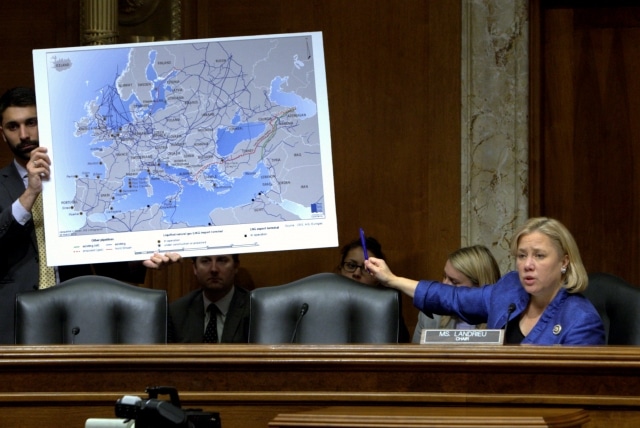In light of ongoing geopolitical tensions in Russia, Ukraine and hotly contested Crimea, three (yes, three!) U.S. Congressional Committees held hearings this week on the U.S. using its newfangled oil and gas bounty as a blunt tool to fend off Russian dominance of the global gas market.
Though 14 combined witnesses testified in front of the U.S. Senate Committee on Energy and Natural Resources, the U.S. House Energy and Commerce Committee’s Subcommittee on Energy and Power and U.S. House Committee on Foreign Relations, not a single environmental voice received an invitation. Climate change and environmental concerns were only voiced by two witnesses.
Using the ongoing regional tumult as a rationale to discuss exports of U.S. oil and gas obtained mainly via hydraulic fracturing (“fracking”), the lack of discussion on climate change doesn’t mean the issue isn’t important to national security types.
Indeed, the Pentagon’s recently published Quadrennial Defense Review coins climate change a “threat force multiplier” that could lead to resource scarcity and resource wars. Though directly related to rampant resource extraction and global oil and gas marketing, with fracking’s accompanying climate change and ecological impacts, “threat force multiplication” impacts of climate change went undiscussed.
With another LNG (liquefied natural gas) export terminal approved by the U.S. Department of Energy (DOE) in Coos Bay, Ore., to non-Free Trade Agreement countries on March 24 (the seventh so far, with two dozen still pending), the heat is on to export U.S. fracked oil and gas to the global market.
So, why wasn’t the LNG climate trump card discussed in a loud and clear way? Well, just consider the source: 11 of the witnesses had ties in one way or another to the oil and gas industry.
Senate Committee on Energy and Natural Resources
Headed by recently named chair U.S. Sen. Mary Landrieu (D-LA), the March 25 U.S. Senate Energy and Natural Resources Committee hearing featured four of five witnesses with industry ties, all of which went undisclosed. It was titled, “Importing Energy, Exporting Jobs. Can it be Reversed?”
“The last thing Putin and his cronies wants (sic) is competition from the United States of America in the energy race,” Landrieu declared in her opening statement. “Tyrants and dictators throughout history have had many reasons to fear revolutions, and this U.S. energy revolution is one they should all keep their eyes on!” More on that later.
Given the enthusiasim conveyed in her statement, perhaps it’s unsurprising Landrieu — whose state of Louisiana is an oil and gas industry hub like few others — also has close industry ties.
Up for re-election in 2014, Landrieu has already taken close to half a million dollars from the industry to the chagrin of environmentalists. Committee Ranking Member Lisa Murkowski (R-AK) has taken $40,600 during this campaign cycle, as well, even though she isn’t up for re-election until 2016.
Daniel Adamson, senior counsel for the committee, worked as a lobbyist for natural gas utility company Avista Corporation from 2004-2010.
And now for the witnesses:
– Adam Sieminski: Before taking the seat as head of the U.S. Energy Information Administration (EIA) in 2012, Sieminski worked in the fossil fuel finance sector.
“From 2005 until March 2012, he was the chief energy economist for Deutsche Bank, working with the bank’s global research and trading units,” explains his EIA biography. “From 1998 to 2005, he served as the director and energy strategist for Deutsche Bank’s global oil and gas equity team.”
– W. David Montgomery: Testifying at both this committee hearing and the U.S. House Energy and Commerce Committee’s Subcommittee on Energy and Power hearing, Montgomery is the senior vice president of NERA (National Economic Research Associates) Economic Consulting.
NERA penned a study on behalf of the DOE published in December 2012 concluding LNG exports will be economically beneficial to the U.S. It recently published an updated follow-up study funded by Cheniere — the first company to receive a permit to export fracked U.S. gas in Sabine Pass, La., in 2012 — concluding “unlimited LNG exports benefit U.S.“
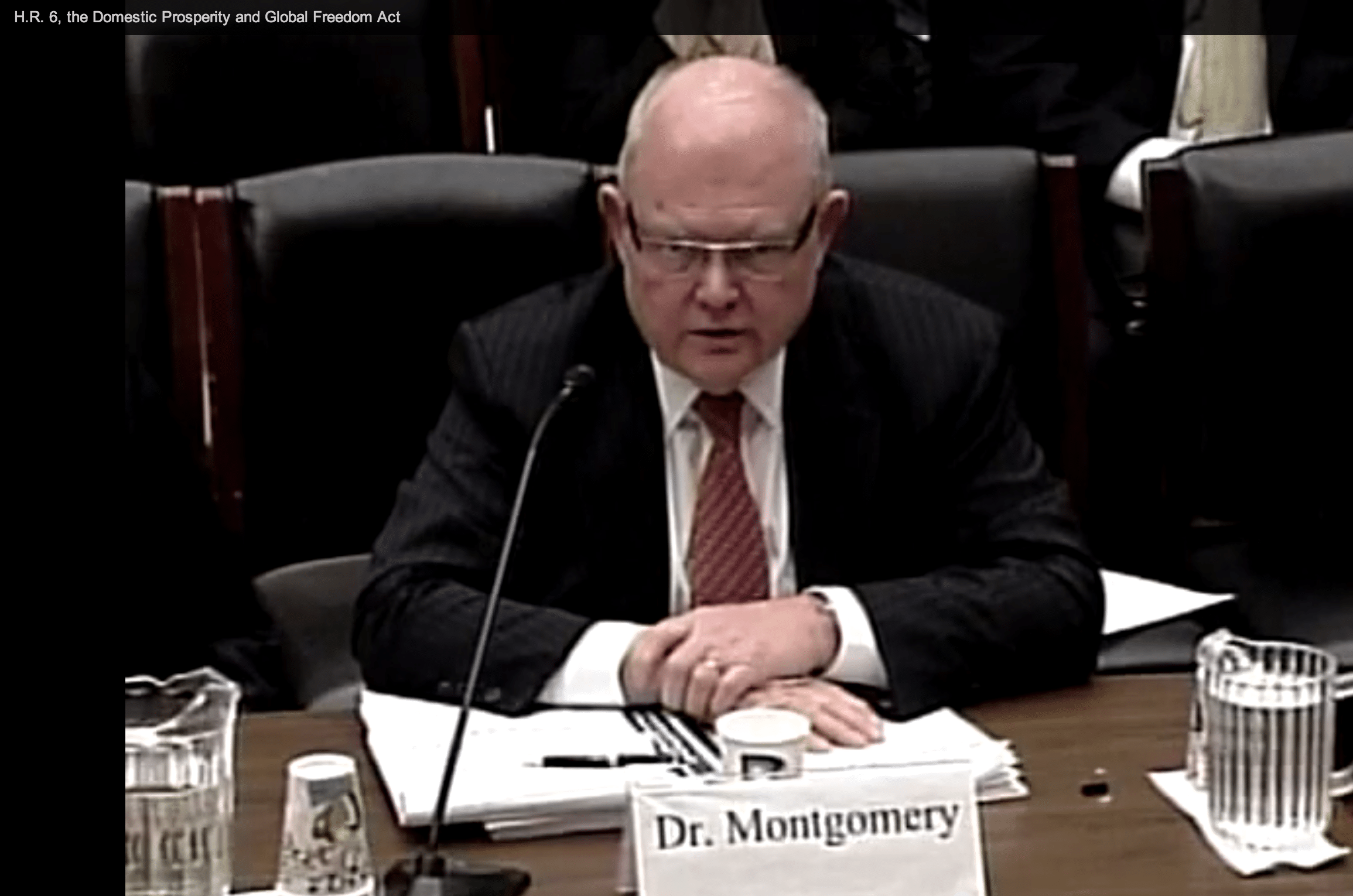
W. David Montgomery; Photo Credit: YouTube Screenshot
Author of a 2009 paper titled, “Organized Hypocrisy as a Tool of Climate Diplomacy,” commissioned by the fossil fuel funded American Enterprise Institute, Montgomery is not a climate change denier. He just doesn’t think anything should be done to tackle climate change.
“Trying to bribe or coerce unwilling countries into curtailing their GHG emissions threatens to cause more harm than good,” he wrote in the American Enterprise Institute paper.
Montgomery sang a similar tune during a March 2011 U.S. House Committee on Science, Space and Technology hearing:
“First, if the U.S. were to act [on climate change] without solid assurance of comparable efforts by China, India, and other industrialized countries, its efforts would make almost no difference to global temperature, especially if industrial production and associated emissions are simply exported to other countries. Second, even global action is unlikely to yield U.S. benefits commensurate with the costs it would incur in making steep GHG emission cuts. Third, globally, even with moderate emission reductions, benefits would not be much greater than costs, and, fourth, conflicting economic interests will make international agreements on mandatory limits unstable.”
He has also done work for the climate change denying think-tanks like the George Marshall Institute and the Heritage Foundation. Because of his track record, Skeptical Science has labeled him a “climate misinformer.”
NERA‘s roots go back to running defense for Big Tobacco, as revealed here on DeSmogBlog.
– David Goldwyn: Goldwyn currently wears many hats. A member of the DOE‘s National Petroleum Council, he also is a corporate attorney for the firm Sutherland, a non-resident fellow at the Brookings Institution and president of oil and gas industry consulting firm Goldwyn Global Strategies LLC.
Before opening up his new consulting firm, Goldwyn worked as Special Envoy for International Energy Affairs at U.S. Department of State from 2009 to 2011.
While working for the State Department, Goldwyn created the Global Shale Gas Initiative (now known as the Unconventional Gas Technical Engagement Program) and its cousin, the Energy Governance and Capacity Initiative. These programs, in essence, are the State Department’s shale gas “missionary force,” in which the Department teams up with U.S. fracking companies to teach “best practices” to countries around the world.
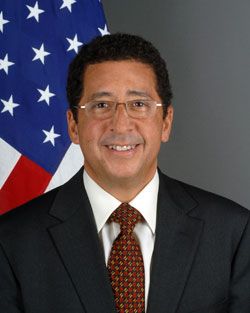
David Goldwyn; Photo Credit: U.S. Department of State
A State Department cable obtained by Wikileaks via whistleblower Chelsea Manning reveals Goldwyn also helped Canadian oil companies develop talking points to promote tar sands during his time working as State Department Special Envoy.
Prior to working for the State Department, Goldwyn owned another consulting firm called Goldywn International Strategies LLC.
Among other things, the firm lobbied on behalf of ConocoPhillips and BP in 2003 to help push through the proposed Alaska Pipeline Project, a gas pipeline that was proposed to bring Alaskan gas to the lower-48. The shale gas revolution has made the need for the project null and void.
It was also during his time working for this consultancy that he did some of his most ugly work with the very same “tyrants and dictators” decried in Landrieu’s opening statement, including working for the Nigerean government to help bolster its oil and gas industry in 2004.
In 2008, Goldwyn lobbied on behalf of the U.S.-Libya Business Group at the time the country was under the dictatorial rule of Muammar Gaddafi, who was killed in October 2011. Goldwyn scrubbed this detail from his biography once he got a job at the State Department.
He also scrubbed out his former gig as an unregistered lobbyist for Turkmenistan, another U.S.-friendly gas-rich and oppressive dictatorship. Goldwyn did so as the former executive director of the U.S.-Turkmenistan Business Council, which was “primarily funded by American oil companies (Chevron, ExxonMobil, Marathon) hoping to do business in the country,” according to investigative journalist Ken Silverstein.
Although dictatorships such as those in Libya and Turkmenistan are “often a threat to their own people, they do not harbor or finance groups that threaten U.S. interests,” Goldwyn once said in a Congressional hearing in speaking to human rights concerns of doing business in these countries.
And Goldwyn’s latest push: opening up the floodgates for U.S. oil and gas companies to operate inside of Mexico.
– Edward Chow: A senior fellow at the Center for Strategic and International Studies’ (CSIS) Energy and National Security Program, a conservative think-tank, Chow worked for two decades at Chevron.
“While he was Chevron’s principal international representative in Washington, he worked closely with the White House, Capitol Hill, federal departments and agencies, foreign governments, international financial institutions, and the foreign policy community on international economic policy affecting worldwide energy investments,” explains Chow’s CSIS biographical sketch. “Between 1989 and 1991, he was based in Beijing as Chevron’s country manager for China.”
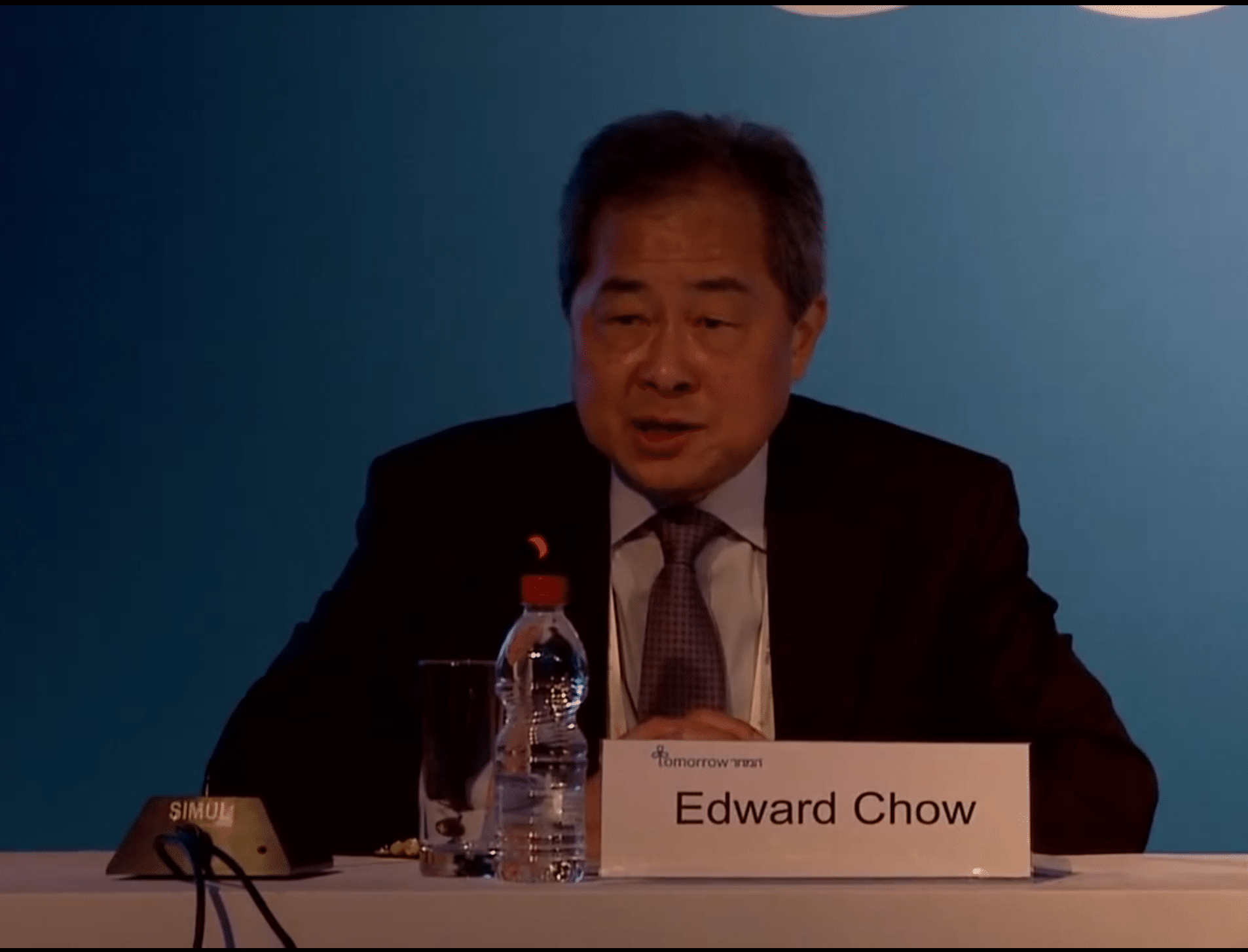
Edward Chow; Photo Credit: YouTube Screenshot
Like Goldwyn, Chow has maintained close ties with Turkmenistan. Wikileaks cables reveal he visited from March to April 2009 to offer “his assessment of Turkmenistan’s oil and gas prospects” and discuss “policy perspectives on development of the country’s oil and gas sector” with the country’s Deputy Foreign Minister Wepa Hajiyev.
As he disclosed in an August 2013 Congressional testimony, Chow also serves as an advisor to the State Department on the Turkmenistan–Afghanistan–Pakistan–India (TAPI) Pipeline. TAPI, stalled for years due to Taliban insurgency in Afghanistan, is set to pump Turkemenistan’s gas to Fazilka, India, located near the Pakistan-India border.
ExxonMobil, which has an office in Turkmenistan, “has expressed interest in financing and running the pipeline project,” according to the Oman Tribune.
Rounding the circle, in 2011 ExxonMobil gave CSIS a $4 million grant.
U.S. House Energy and Power Subcommittee
The U.S. House Energy and Commerce Subcommittee on Energy and Power hearing honed in on the proposed H.R. 6, colloquially known as the “Domestic Prosperity and Global Freedom Act.” With 42 co-sponsors (40 Republicans, 2 Democrats), the bill mandates expedited approval of LNG permits with World Trade Organization countries.
The bill was proposed on March 6 in the midst of ongoing events between Ukraine and Russia and roughly one month after the Energy and Commerce Committee published its report titled, “Prosperity at Home and Strengthened Allies Abroad — A Global Perspective on Natural Gas Exports.”
“Passing this legislation sends the clear signal that America intends to take full advantage of our energy resources…to ensure the lifeline of U.S. gas supplies will be available to our allies, and that we will stand firm to Putin and supplant Russia’s influence,” said U.S. House Energy and Commerce Committee Chairman Rep. Fred Upton (R-MI) in a press release announcing the legislation.
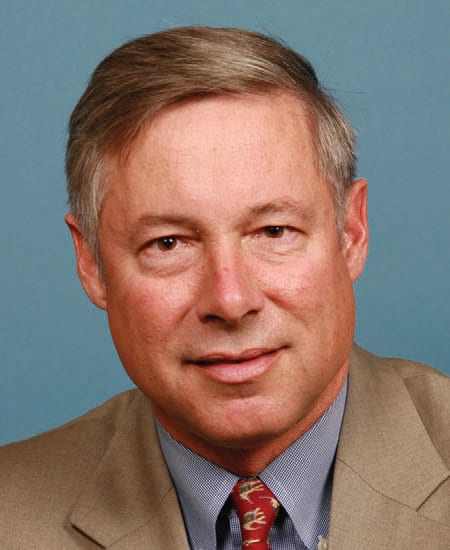
U.S. Rep. Fred Upton (R-MIWikimedia Commons
Upton’s Public Disclosure forms for 2012 reveal he invested $1,000 to $15,000 in BP, $15,000 to $50,000 in Chesapeake, $16,000 tp $65,000 in GE and $115,000 to $300,000 in ExxonMobil.
As investigative journalist Lee Fang revealed, subcommittee “staff counsel Patrick Currier is a former lobbyist for gas and energy companies, including the Gas Processors Association, FirstEnergy Corp, and the CCS Alliance…[and] chief counsel Tom Hassenboehler is a former lobbyist for America’s Natural Gas Alliance, one of the most vocal trade groups pushing to build more LNG export capacity.”
Fang also discovered Subcommittee chair Rep. Ed Whitfield (R-KY) holds between $250,000 and $500,000 in stock with both ExxonMobil and Chevron. Whitfield has taken $70,500 from the oil and gas industry during this election cycle and took $126,500 from the industry during his 2012 race for office.
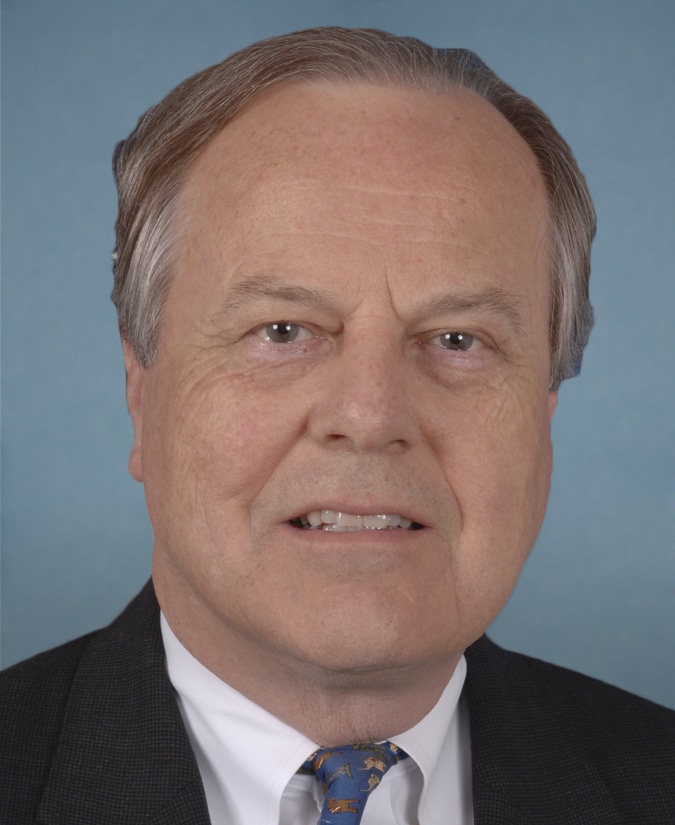
U.S. Rep. Ed Whitfield; Photo Credit: Wikimedia Commons
Further, manager of press operations for the Subcommittee on Energy and Power Charlotte Baker formerly worked as an Account Executive at DCI Group, a PR and lobbying firm with close ties to the Republican Party and the oil and gas industry.
According to LinkedIn, Baker worked on “advocacy and strategic communications campaigns for organizations faced with regulatory challenges, focusing on energy, environment, and public safety issues.”
Among the organizations focusing on energy and environmental issues DCI Group holds as a client: ExxonMobil, which paid DCI $320,000 to work on its behalf in 2013. Exxon and DCI began their relationship with one another in 2005.
In addition, Committee on Energy and Commerce General Counsel Michael Bloomquist worked as an oil and gas industry lobbyist before obtaining his job at the Committee in 2011. Lobbyist disclosure forms reveal he lobbied on behalf of America’s Natural Gas Alliance, Plains Exploration, Marathon Oil and the Gas Producers Association.
Witnesses with oil and gas industry ties included:
– Paula Gant: Gant is the DOE Deputy Assistant Secretary for oil and natural gas. She got there by passing through the government-industry revolving door. She formerly worked as senior vice president for policy and planning for the American Gas Association, a gas industry trade association which supports LNG exports.
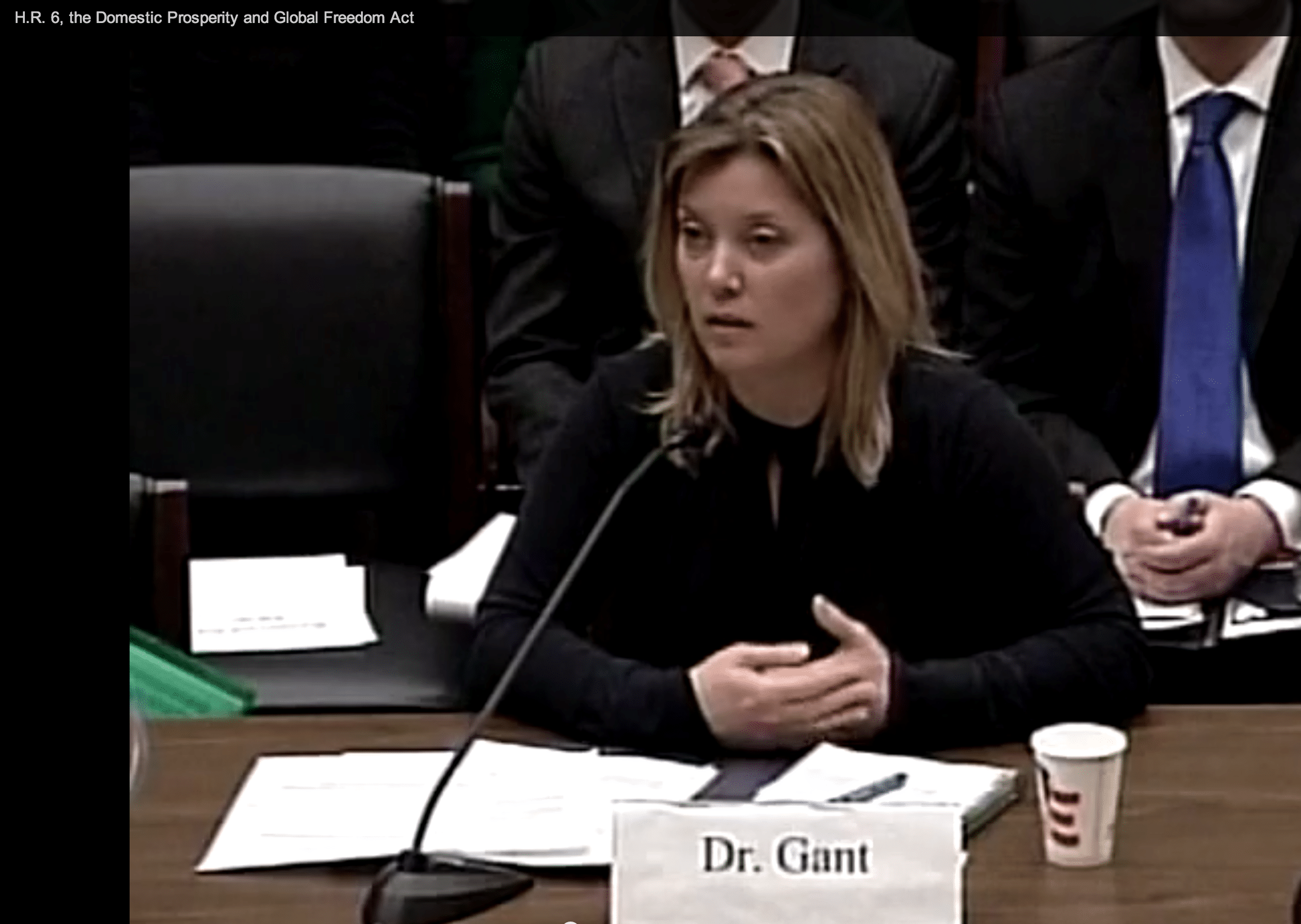
Paula Gant; Photo Credit: YouTube Screenshot
– Anita Orbán: Author of the book “Power, Energy, and the New Russian Imperialism,” Orbán sits as Hungary’s Ambassador-at-Large for Energy Security. She also testified in October 2013 in front of the subcommittee in a hearing titled, “The Geopolitical Implications and Mutual Benefits of U.S. LNG exports.”
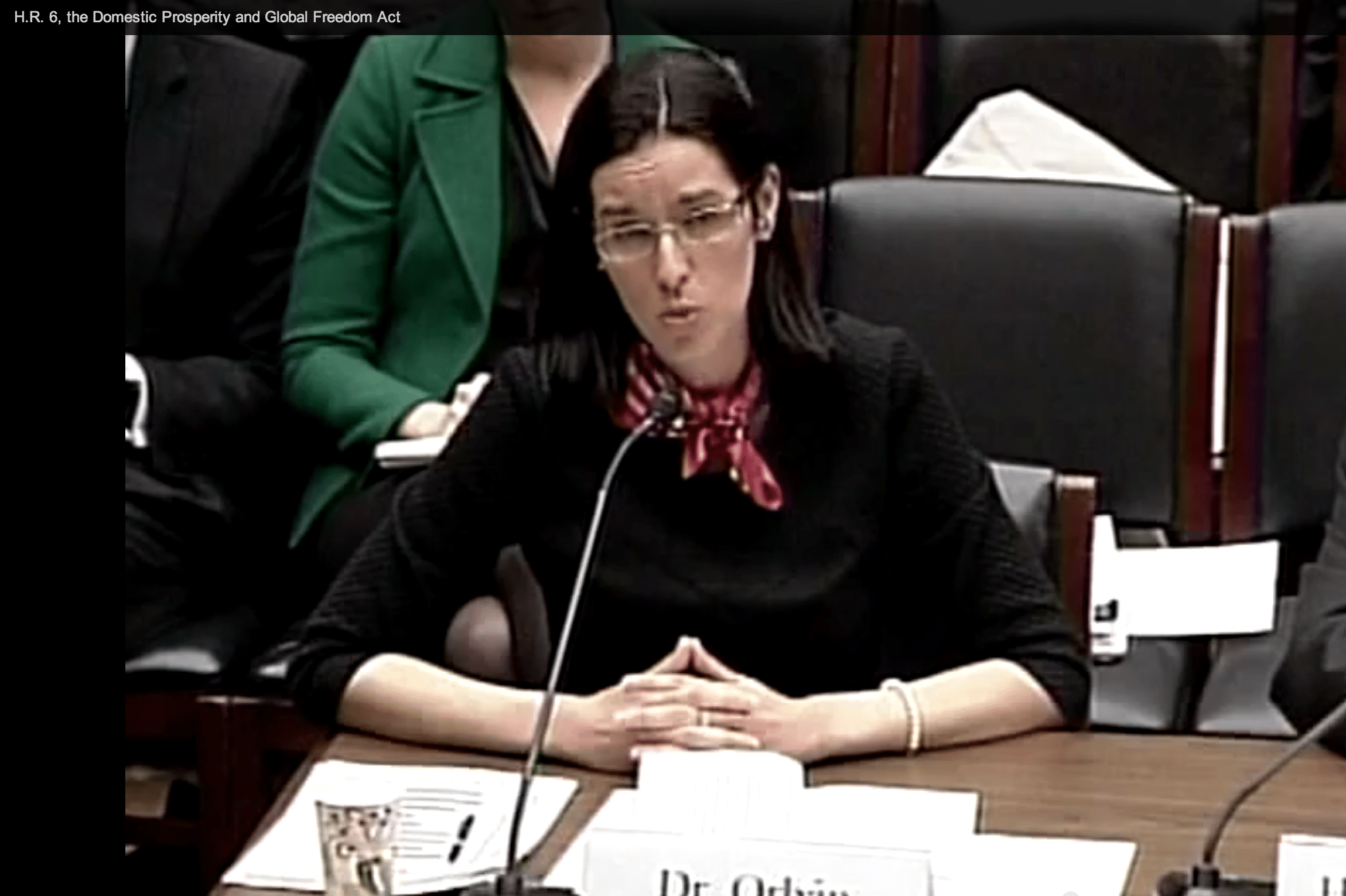
Anita Orbán; Photo Credit: YouTube Screenshot
Orban worked at industry-funded think-tanks Heritage Foundation and Hudson Institute while working toward her PhD at Tufts University.
– Kenneth Ditzel: A principal at Charles River Associates, Ditzel formerly worked as a production engineer at Dow Chemical.
Dow is part of the chemical industry-funded coalition called America’s Energy Advantage, which has rallied against the rampant push to export U.S. oil and gas. But, given the company’s own toxic legacy, it’s far from an environmental voice and climate change isn’t among its concerns.
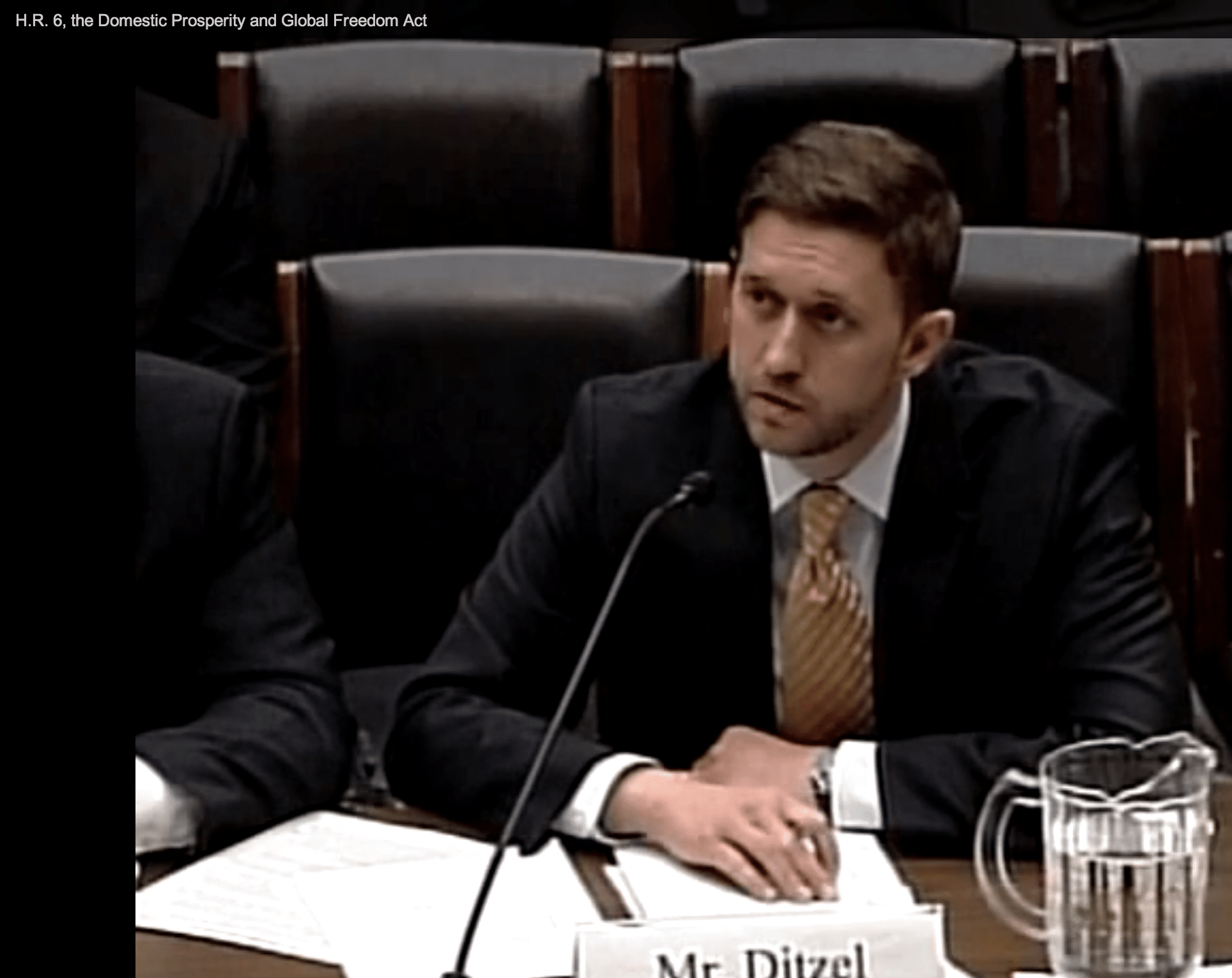
Kenneth Ditzel; Photo Credit: YouTube Screenshot
Ditzel authored a Dow Chemical-funded report in February 2013 titled, “US Manufacturing and LNG Exports: Economic Contributions to the US Economy and Impacts on US Natural Gas Prices.”
America’s Energy Advantage — which also came out against the approval of the Jordan Cove LNG export facility in Coos Bay, Ore., — advocates for the State Department’s “missionary force” approach for shale gas diplomacy, as it opined in a press release about the Energy and Power subcommittee’s hearing.
“To weaken Putin and strengthen our European allies, the Committee should be focused on the export of American drilling technology and know-how to allies so they can develop their own domestic shale gas resources,” reads the press release. “It is much better to teach a man to fish than to give him a fish.”
– Dave Schryver: Executive vice president of the American Public Gas Association, which is also a member of America’s Energy Advantage.
U.S. House Committee on Foreign Affairs
The U.S. House Committee on Foreign Affairs also held a hearing titled, “The Geopolitical Potential of the U.S. Energy Boom.”
Committee Chair U.S. Rep. Ed Royce (R-CA) took $10,500 from the oil and gas industry for the 2012 elections and has already taken $13,000 in the run-up to the 2014 elections.
Further, all four witnesses have industry ties:
– Harold Hamm: The chairman and CEO of Continental Resources, Hamm served as Republican Party presidential candidate Mitt Romney’s energy adviser during his race against President Barack Obama in 2012. He’s also the chairman of the lobbying and campaign contribution powerhouse Domestic Energy Producers Alliance and broke campaign contribution giving limit rules during the 2012 campaign.
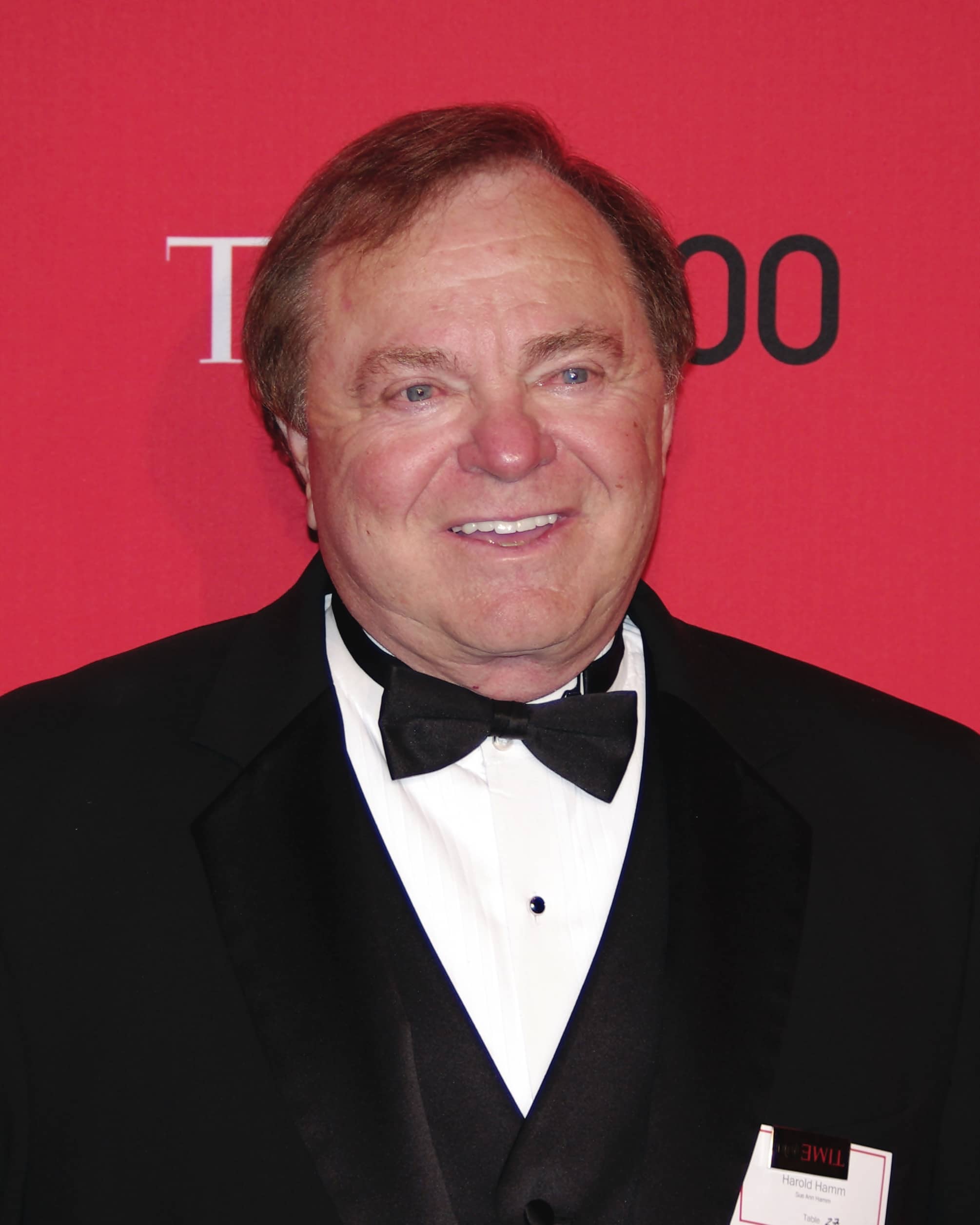
Harold Hamm; Photo Credit: Wikimedia Commons
– Elizabeth Rosenberg: Rosenberg is a senior fellow and director of the energy, environment and security program for the Center for a New American Security (CNAS). CNAS receives industry funding aplenty, from the likes of America’s Natural Gas Alliance, ConocoPhillips, General Electric and Chevron.
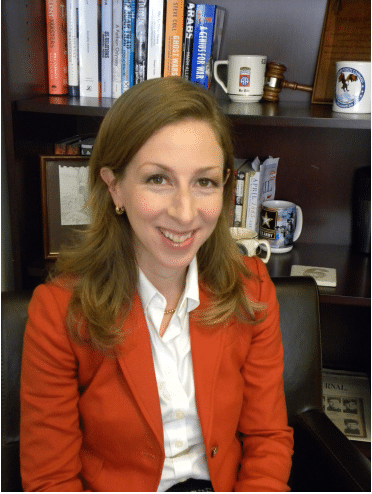
Elizabeth Rosenberg; Photo Credit: U.S. House Committee on Foreign Affairs
While far from a robust analysis of climate change and environmental concerns, Rosenberg did mention “concerns about the environmental and community effects of the energy boom and further growth in unconventional energy globally” during her testimony.
– Michael Levi: The David M. Rubenstein senior fellow and director of the program on energy security and climate change for the Council on Foreign Relations, Levi’s fellowship is named after and funded by the CEO of private equity firm giant, the Carlyle Group.
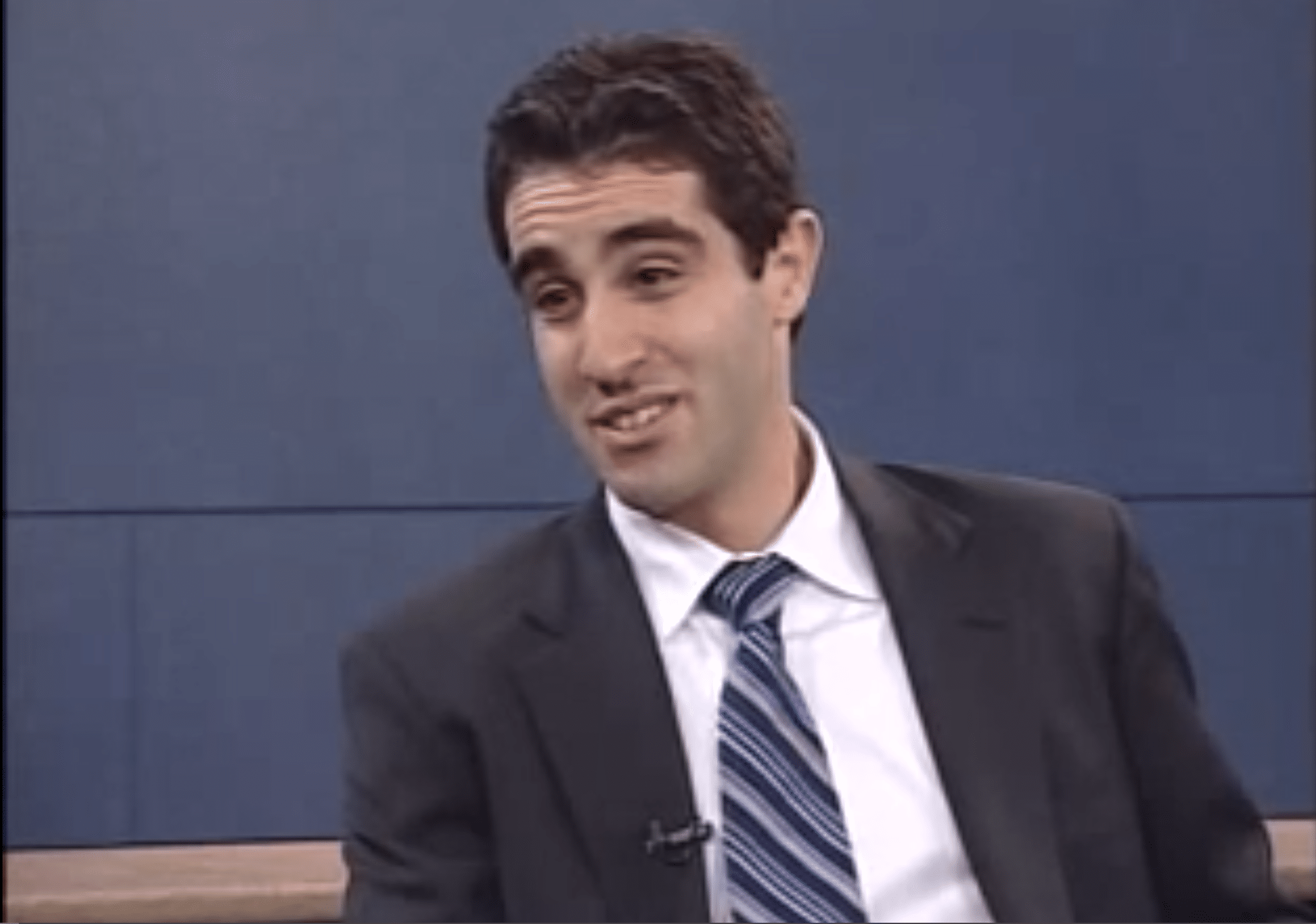
Michael Levi; Photo Credit: YouTube Screenshot
“Energy is one of the investment fields Carlyle specializes in, and it recently escalated its energy holdings by buying a $424 million stake in NGP Energy Capital Management (for ‘Natural Gas Partnership’),” explained Fairness and Accuracy in Reporting.
Carlyle also co-owns a major oil refinery in Philadelphia, Philadelphia Energy Solutions, a joint venture with Sunoco. That refinery is a major recipient of oil fracked from North Dakota’s Bakken Shale basin, which is delivered to the refinery via freight rail.
Council on Foreign Relations oil and gas industry corporate members include BP, Chevron, ExxonMobil, Eni, Shell, Total, Occidental Petroleum, ConocoPhillips and GE.
Levy mentioned mild concerns about the climate change and environmental impacts of the U.S. unconventional oil and gas boom in his testimony.
–Admiral Dennis Blair: The former Director of National Intelligence, President and CEO of Institute for Defense Analyses and Commander in Chief of U.S. Pacific Command, Blair sits on the Board of Directors of the National Bureau of Asian Research and the National Committee on United States-China Relations. Both of those organizations receive oil and gas industry funding.
National Bureau of Asian Research gets funding from Chevron, ConocoPhillips, ExxonMobil, General Electric, while the National Committee is funded by both Chevron and GE, as well.
During the question/answer session of the hearing, Blair said the U.S. sends troops and goes to war in the Middle East to procure oil.
“Just a Bill…on Capitol Hill”
In elementary school civics class, many children are taught the “Schoolhouse Rock” version song of U.S. politics on how the “legislative sausage is made.”
“While I’m sitting in committee, but I know I’ll be a law someday,” the song goes. “At least I hope and pray that I will, but today I am still just a bill.”
Yet with representatives listening to a slate of witnesses like this on the future of the global energy economy, this isn’t your elementary school version of how Capitol Hill works.
In a sense, given the climate change stakes at play, it’s more like another song: “It’s the End of World (as We Know It).”
Photo Credit: U.S. Senate Energy and Resources Committee
Subscribe to our newsletter
Stay up to date with DeSmog news and alerts


